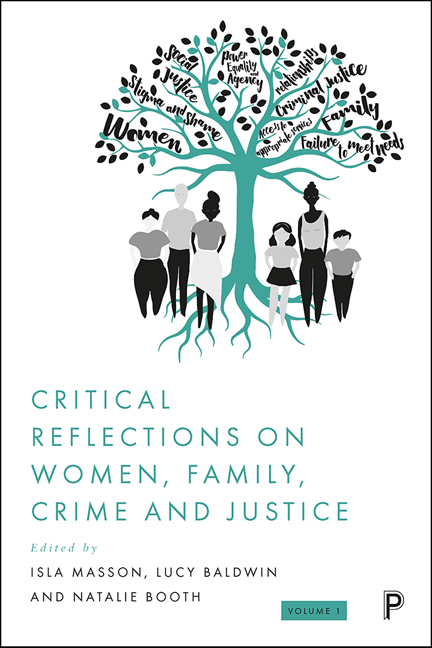Book contents
- Frontmatter
- Contents
- List of figures
- Notes on the contributors
- Acknowledgements
- Foreword: critical reflections from the Women, Family, Crime and Justice network
- 1 Starting the conversation: an introduction to the Women, Family, Crime and Justice network
- 2 Playing the game: women and community punishment
- 3 Harmful social and cultural practices that exist within South Asian communities in the UK and their impact on women
- 4 Exploring shame, love and healing within women’s recovery: an analysis of a trauma-specific intervention
- 5 Reducing the enduring harm of short terms of imprisonment
- 6 ‘Without it you’re lost’: examining the role and challenges of family engagement services in prisons
- 7 What are the challenges and opportunities for schools in supporting children of people in prison?
- 8 Impact and engagement work in the context of families of people in prison
- 9 Presence, voice and reflexivity in feminist and creative research: a personal and professional reflection
- 10 Service users being used: thoughts to the research community
- 11 Continuing the conversation: reflections from the Women, Family, Crime and Justice network
- Index
6 - ‘Without it you’re lost’: examining the role and challenges of family engagement services in prisons
Published online by Cambridge University Press: 21 December 2021
- Frontmatter
- Contents
- List of figures
- Notes on the contributors
- Acknowledgements
- Foreword: critical reflections from the Women, Family, Crime and Justice network
- 1 Starting the conversation: an introduction to the Women, Family, Crime and Justice network
- 2 Playing the game: women and community punishment
- 3 Harmful social and cultural practices that exist within South Asian communities in the UK and their impact on women
- 4 Exploring shame, love and healing within women’s recovery: an analysis of a trauma-specific intervention
- 5 Reducing the enduring harm of short terms of imprisonment
- 6 ‘Without it you’re lost’: examining the role and challenges of family engagement services in prisons
- 7 What are the challenges and opportunities for schools in supporting children of people in prison?
- 8 Impact and engagement work in the context of families of people in prison
- 9 Presence, voice and reflexivity in feminist and creative research: a personal and professional reflection
- 10 Service users being used: thoughts to the research community
- 11 Continuing the conversation: reflections from the Women, Family, Crime and Justice network
- Index
Summary
‘Without it [family support] you’re lost. I was lost before I spoke to [the family engagement worker]. I couldn't deal with the emotions I was dealing with, with the children, not knowing what was going on.’ (Elle, quoted in Dominey at al, 2016, p 62)
Introduction
Drawing from current literature, policy and recent reviews of family engagement services (FES) in prison, this chapter explores the role and challenges of implementing FES in the public prison sector. Situating current services in a neoliberal context, the chapter examines barriers and potential for delivering high-quality and caring FES in the women's prison estate.
FES in prisons are defined as ‘a specialised casework service based in prison which aim to build and maintain contact between prisoners and their family members’ (Dominey et al, 2016, p 7). They offer emotional and practical support to prisoners and their families, intending to improve wellbeing and minimise the trauma of family separation as far as possible, as well as aiming to increase life chances for prisoners’ children (Dominey et al, 2016). FES were identified by prisoners as lifting moods, offering hope, reducing self-harm and providing consistent care and support (Dominey et al, 2016). In recent years, the perception of FES by prisons has shifted from an optional, albeit useful, service (Hucklesby and Corcoran, 2016) to one that is essential and contributes to prisoner safety and wellbeing (Dominey et al, 2016) in a prison landscape severely affected by overcrowding and understaffing (Prison Reform Trust, 2019). While this recognition of the benefit of FES is evidence-based and valued by family service organisations, the necessary integration of family service organisations into prisons can pose practical and ideological challenges, as this chapter examines.
This chapter explores the role of FES predominantly from the view of the Prison Advice and Care Trust (Pact). Pact was founded in 1898 (as the Catholic Prisoners Aid Society) and was integral to the development and implementation of FES in prisons. This chapter utilises my own experience as a Pact employee in groupwork and family roles across the prison estate. Literature examining family services in prisons is limited, therefore the chapter draws heavily from recent research commissioned by Pact, Bridging the Gap: A Review of the Pact Family Engagement Services (Dominey et al, 2016).
- Type
- Chapter
- Information
- Critical Reflections on Women, Family, Crime and Justice , pp. 107 - 128Publisher: Bristol University PressPrint publication year: 2021

